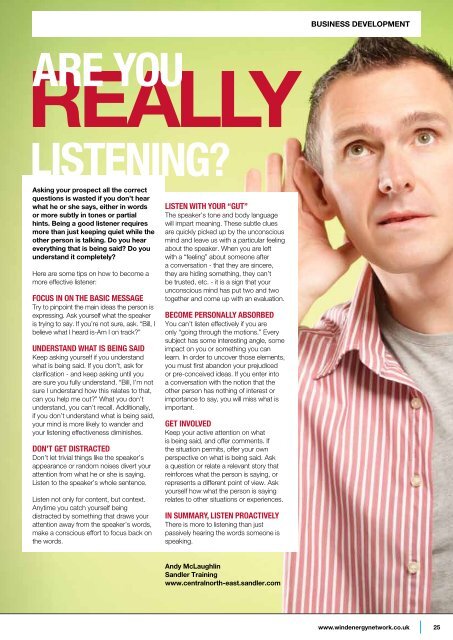UNEXPLODED ORDNANCE - Wind Energy Network
UNEXPLODED ORDNANCE - Wind Energy Network
UNEXPLODED ORDNANCE - Wind Energy Network
Create successful ePaper yourself
Turn your PDF publications into a flip-book with our unique Google optimized e-Paper software.
BUSINESS DEVELOPMENT<br />
REALLY<br />
Are You<br />
Listening<br />
Asking your prospect all the correct<br />
questions is wasted if you don’t hear<br />
what he or she says, either in words<br />
or more subtly in tones or partial<br />
hints. Being a good listener requires<br />
more than just keeping quiet while the<br />
other person is talking. Do you hear<br />
everything that is being said Do you<br />
understand it completely<br />
Here are some tips on how to become a<br />
more effective listener:<br />
FOCUS in on the basic message<br />
Try to pinpoint the main ideas the person is<br />
expressing. Ask yourself what the speaker<br />
is trying to say. If you’re not sure, ask. “Bill, I<br />
believe what I heard is-Am I on track”<br />
UNDERSTAND what is being said<br />
Keep asking yourself if you understand<br />
what is being said. If you don’t, ask for<br />
clarification - and keep asking until you<br />
are sure you fully understand. “Bill, I’m not<br />
sure I understand how this relates to that,<br />
can you help me out” What you don’t<br />
understand, you can’t recall. Additionally,<br />
if you don’t understand what is being said,<br />
your mind is more likely to wander and<br />
your listening effectiveness diminishes.<br />
Don’t get DISTRACTED<br />
Don’t let trivial things like the speaker’s<br />
appearance or random noises divert your<br />
attention from what he or she is saying.<br />
Listen to the speaker’s whole sentence.<br />
Listen not only for content, but context.<br />
Anytime you catch yourself being<br />
distracted by something that draws your<br />
attention away from the speaker’s words,<br />
make a conscious effort to focus back on<br />
the words.<br />
Listen with your “GUT”<br />
The speaker’s tone and body language<br />
will impart meaning. These subtle clues<br />
are quickly picked up by the unconscious<br />
mind and leave us with a particular feeling<br />
about the speaker. When you are left<br />
with a “feeling” about someone after<br />
a conversation - that they are sincere,<br />
they are hiding something, they can’t<br />
be trusted, etc. - it is a sign that your<br />
unconscious mind has put two and two<br />
together and come up with an evaluation.<br />
Become PERSONALLY absorbed<br />
You can’t listen effectively if you are<br />
only “going through the motions.” Every<br />
subject has some interesting angle, some<br />
impact on you or something you can<br />
learn. In order to uncover those elements,<br />
you must first abandon your prejudiced<br />
or pre-conceived ideas. If you enter into<br />
a conversation with the notion that the<br />
other person has nothing of interest or<br />
importance to say, you will miss what is<br />
important.<br />
Get INVOLVED<br />
Keep your active attention on what<br />
is being said, and offer comments. If<br />
the situation permits, offer your own<br />
perspective on what is being said. Ask<br />
a question or relate a relevant story that<br />
reinforces what the person is saying, or<br />
represents a different point of view. Ask<br />
yourself how what the person is saying<br />
relates to other situations or experiences.<br />
In summary, LISTEN PROACTIVELY<br />
There is more to listening than just<br />
passively hearing the words someone is<br />
speaking.<br />
Andy McLaughlin<br />
Sandler Training<br />
www.centralnorth-east.sandler.com<br />
www.windenergynetwork.co.uk<br />
25

















